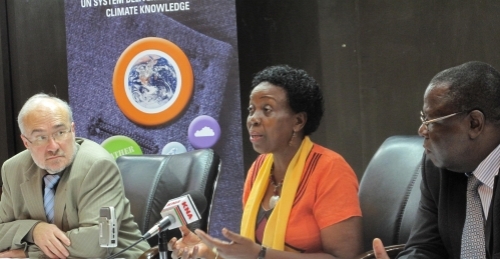THE First Conference of Ministers Responsible for Meteorology in Africa going on in Nairobi is expected to endorse a declaration whose first aim is to strengthen and sustain National Meteorological Services as a fundamental component of the national development infrastructure of all countries in the continent.
A draft Ministerial Declaration released early today at a preparatory meeting of experts and partners of all sectors concerned has outlined eight proposals to be tabled at the ministerial conference.
The proposals were drafted after three days of intensive deliberations seeking to devise strategies of enhancing agricultural production in the wake of devastating climate change.
In what may be dubbed as the Nairobi Declaration, some of the proposals will seek to address issues related to security and sustainable development, particularly poverty reduction efforts and climate change adaptation.
The draft declaration seeks to establish the African Ministerial Conference on Meteorology (AMCOMET) as a high level mechanism for the development of meteorology and its applications in Africa. The mechanism may also have sub-regional components consistent with the Regional Economic Communities that may decide further that AMCOMET meet after every two years.
The experts have proposed in the draft declaration that a Task Force composed of a chairperson and representatives from the five sub-regions be established, to spell out the institutional arrangements and working operations of AMCOMET in close cooperation with Africa Union (AU) and the World Meteorological Organisation (WMO).
Ministers will also be expected to endorse a proposal to develop, within one year or two, an action plan for enhancing cooperation between African countries.
According to the draft declaration, this aims at strengthening the capabilities of the countries’ National Meteorological Services (NMSs) and existing Regional and Sub-regional climate centers in Africa so as to effectively meet government and societal requirements for weather and climate information and services.
Ministers will call upon the development partners, the international community and the UN system and its agencies to support AMCOMET and the preparation and implementation of the Action Plan.
The proposals in the Draft declaration emanate from revelations that, Africa may not meet her food requirements after all.
In the various sessions of the ongoing conference including a journalists’ workshop organized by Media2, Experts have warned that Africa may not feed itself unless it adopts new agricultural methods and technologies in line with climate change.
The Climate Change phenomenon is currently a major global concern going by the emergency of numerous natural disasters.
At a press conference also addressed by WMO Director, Michel Jarraud and AU Commissioner in charge of Rural Economy and Agriculture, Tumusiime R. Peace, Kenya Meteorological Department Director, Dr. Joseph Mukabana said that before the El Nino rains came pounding the country in late 2009, all sectors had been affected by a fierce drought, agriculture and livestock being the most hit.
“All sectors of activity are concerned – in particular, agriculture and food security, transport, public health, water resources management, energy and tourism,” said Mukabana also the Permanent Representative of Kenya with WMO.
The three expressed a need that climate infrastructure services should be strengthened to curb imminent natural disasters.
In relation to this, Jarraud said that the available Satellites are not sufficient to translate disaster predictions to warnings.
Ms. Tumusiime lauded the ongoing meeting as the platform for coming up with decisions that will have a long positive impact of the required interventions to meet the challenges posed by Climate Change.
While in the process of endorsing the draft, the ministers representing 52 countries are expected to consider risk assessments conducted by the World bank and other institutions that adverse weather events and agricultural commodity price fluctuations are among the most significant sources of risk for rural livelihoods in lower income countries.
ENDS/APRIL/ 14/2010


